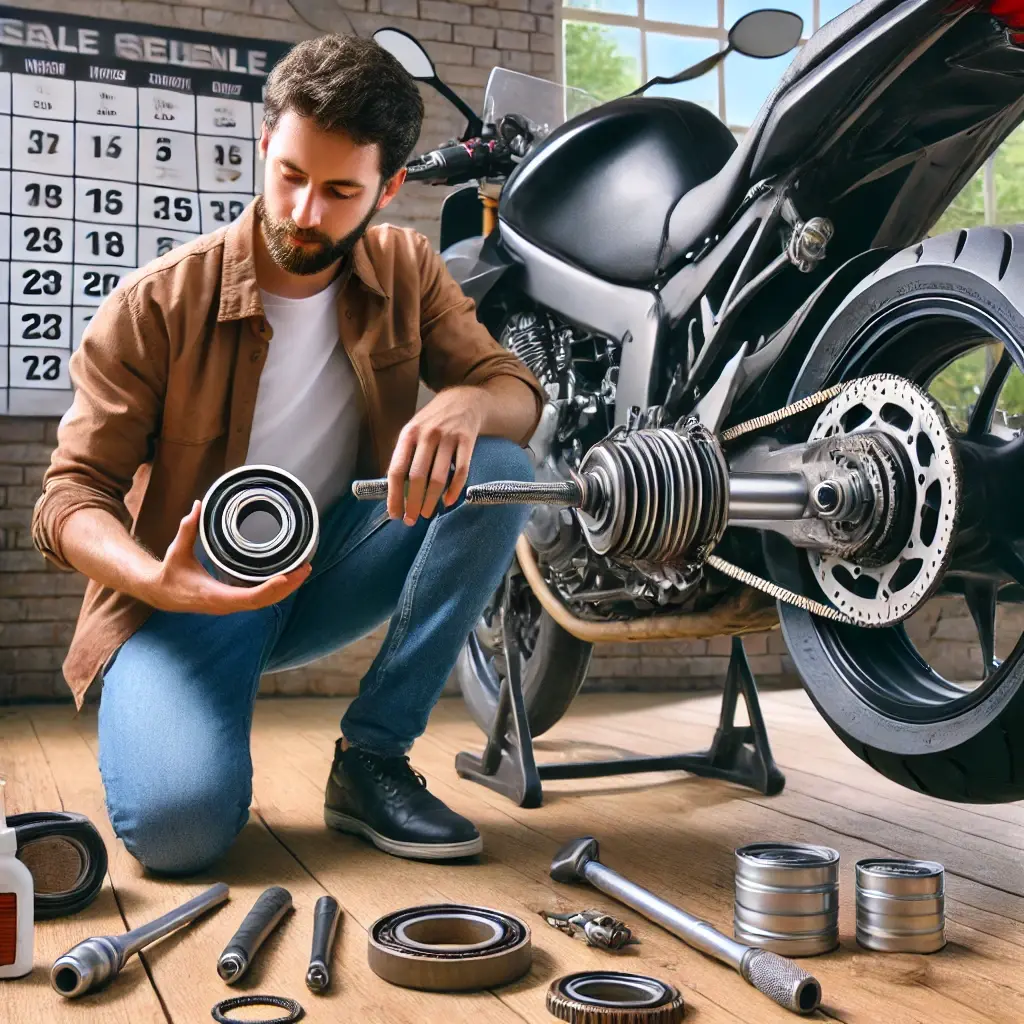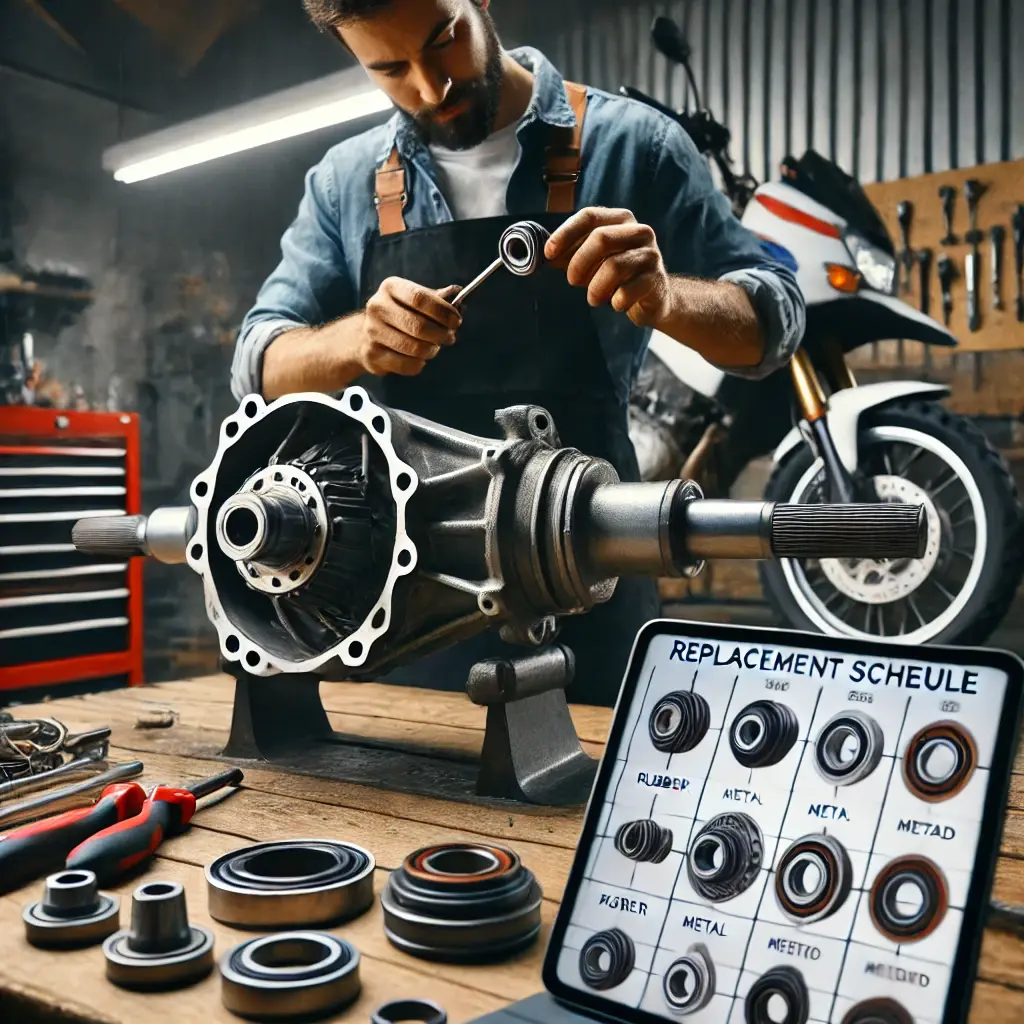How Often Should You Replace Motorcycle Axle Seals?
Maintaining your motorcycle is key to ensuring its longevity and optimal performance. One important but often overlooked component is the axle seal. If you’ve ever wondered, “How often should I replace my motorcycle’s axle seals?” you’re not alone. Let’s dive into everything you need to know about motorcycle axle seals, how often to replace them, and the warning signs to watch out for.
When it comes to maintaining your motorcycle, some components may seem minor but play a crucial role in the bike’s overall performance and longevity. One such component is the axle seal. These seals ensure the smooth operation of your motorcycle’s axles by keeping contaminants out and maintaining proper lubrication. In this article, we’ll explore the importance of axle seals, how often they should be replaced, and the steps you can take to ensure their longevity.
What Are Motorcycle Axle Seals?
Axle seals are small but essential rubber rings that sit between the axle and the wheel hub. Their primary job is to keep debris, dirt, and water out of the axle housing while keeping lubrication inside. By doing so, axle seals ensure that the moving parts within the axle assembly remain protected and properly lubricated.
Why Are Axle Seals Important?
Axle seals are critical for preventing contamination and maintaining lubrication within the axle assembly. Dirt, water, and road debris can quickly wear down the internal components of the axle if the seals are damaged or worn out. By keeping contaminants at bay, axle seals help extend the life of your motorcycle’s axles and bearings, which in turn improves the overall performance of the bike.

How Often Should You Replace Motorcycle Axle Seals?
The frequency of axle seal replacement depends on several factors. While some manufacturers recommend checking the seals every 10,000 to 20,000 miles, the exact replacement interval may vary based on your motorcycle’s make, model, and usage.
Manufacturer Recommendations
Always check your motorcycle’s manual for specific manufacturer recommendations regarding axle seal maintenance. Some bikes may require more frequent inspections due to the design of the axles or the type of riding they are intended for.
Mileage-Based Replacement
A general rule of thumb is to replace your axle seals every 20,000 to 30,000 miles, or sooner if you notice signs of wear and tear. Off-road riders or those who frequently ride in harsh conditions may need to replace their seals more often due to the increased exposure to dirt and moisture.
Environmental and Usage Factors
Where and how you ride plays a big role in how often you’ll need to replace your axle seals. If you frequently ride in wet, muddy, or dusty environments, the seals may degrade faster. Similarly, aggressive riding styles can increase the wear on axle seals.
Signs Your Motorcycle Axle Seals Need Replacing
Visible Leaks
One of the most obvious signs that your axle seals are failing is the presence of leaks around the axle area. If you notice oil or grease dripping from the axle, it’s a clear indicator that the seal is no longer doing its job.
Noises from the Axle Area
Unusual noises such as grinding or squealing coming from the axle could indicate that the seals have worn out, allowing contaminants to get inside and affect the bearings.
Unusual Tire Wear
Axle seals help keep your wheels aligned and rotating smoothly. If they are worn out, you may notice uneven tire wear, which can be a sign that the axle assembly is not functioning properly.
What Happens if You Don’t Replace Faulty Axle Seals?
Failing to replace worn-out axle seals can lead to serious damage to your motorcycle’s axle assembly. Contaminants like dirt and water can infiltrate the system, leading to increased friction, wear, and even failure of the axle components. Over time, this can result in expensive repairs, including replacing the axle, bearings, and other affected parts.

How to Check the Condition of Your Axle Seals
Regularly inspecting your motorcycle’s axle seals can help you catch any issues before they become major problems.
Visual Inspection
Simply looking at the seals for cracks, splits, or leaks is often the best way to assess their condition. If the seal appears damaged or if there is oil around the axle, it’s time for a replacement.
Signs of Wear and Tear
Check for any deformation, hardening, or visible damage to the seal material. Over time, rubber seals can become brittle and less effective at sealing the axle.
Step-by-Step Guide to Replacing Motorcycle Axle Seals
Tools Required
- Wrenches
- Axle puller
- Replacement axle seals
- Grease or oil
Safety Precautions
Before beginning any repair, make sure your motorcycle is securely elevated and that the wheels are properly supported.
Removing the Old Seals
- Begin by removing the wheel from the motorcycle.
- Use an axle puller to carefully extract the axle from the hub.
- Once the axle is free, gently pry the old seal out using a flathead screwdriver.
Installing New Axle Seals
- Clean the area around the axle housing.
- Apply a light layer of grease or oil to the new seal.
- Press the new seal into place, ensuring it is seated evenly and securely.
- Reinstall the axle and wheel assembly.
Professional vs. DIY Replacement
Pros of DIY Replacement
- Cost-effective
- Immediate satisfaction
Cons of DIY Replacement
- Requires proper tools and experience
- Risk of improper installation
When to Seek Professional Help
If you’re unsure about your ability to replace the axle seals properly, it’s always a good idea to consult a professional mechanic.
Choosing the Right Axle Seals for Your Motorcycle
OEM vs. Aftermarket Parts
Original Equipment Manufacturer (OEM) seals are designed specifically for your motorcycle model, while aftermarket seals may offer performance benefits or lower costs.
Material Considerations
Axle seals are typically made from rubber, but some high-performance options use advanced materials for enhanced durability.
Extending the Life of Your Motorcycle Axle Seals
Regular Maintenance Tips
Clean the axle and surrounding area regularly to prevent debris from building up around the seal.
Best Practices for Seal Care
Avoid exposing the seals to excessive heat or pressure, as this can accelerate their wear.
The Role of Quality in Axle Seal Longevity
High-Quality Seals vs. Cheaper Options
Investing in high-quality seals may save you money in the long run by reducing the frequency of replacements.
Cost of Replacing Motorcycle Axle Seals
DIY Costs
The cost of axle seals ranges from $10 to $50, depending on the make and model of your motorcycle.
Professional Replacement Costs
Expect to pay between $100 and $200 for professional axle seal replacement, including labor costs.
Conclusion
Regularly replacing your motorcycle’s axle seals is a simple but important step in maintaining your bike’s performance. By following the manufacturer’s guidelines, inspecting the seals regularly, and replacing them as needed, you can avoid costly repairs and extend the life of your motorcycle’s axle assembly.
FAQs
Are axle seals covered under motorcycle warranties?
In some cases, axle seals may be covered under the motorcycle’s warranty. Check with your manufacturer for specific details.
How long do axle seals typically last?
Axle seals typically last between 20,000 to 30,000 miles, depending on usage and environmental conditions.
Can I ride with a leaking axle seal?
It’s not recommended to ride with a leaking axle seal as it can lead to further damage to the axle and bearings.
How much does it cost to replace an axle seal?
DIY costs range from $10 to $50, while professional replacements can cost between $100 and $200.
What happens if axle seals aren’t replaced in time?
Failure to replace axle seals can lead to contamination, increased friction, and damage to the axle assembly.

